A travel blog for stage 1, from Frankfurt to Budapest, has been published earlier.
Day 6: Thessaloniki, Greece
Juuso Järviniemi (Paris, France)
The last stop on our journey was Greece’s second-biggest city, Thessaloniki. Our welcome dinner at a restaurant featured several starters, especially cheeses, as our group sat next to two men singing traditional Greek songs. A lovely warm night with people who had become good friends in the past few days!
The day of outdoor campaigning took place at the international assembly of the Erasmus Student Network that was held in Thessaloniki the same weekend. When campaigning with people on the street, we normally started a conversation by asking people if they have heard about the European elections. In Thessaloniki, we went straight for federalism, and distributed many copies of JEF’s federalist manifesto to ESN activists. There were many locals passing through the area but the environment enabled us to discuss the elections in countries all across Europe!
After the event finished, we gathered by the sea to film our Backstreet Boys video: “I Want It That Way” rewritten with pro-European lyrics. An emotional but cheerful finish to our long week of campaigning! Once we were done, we sat on the pier, as a final challenge came our way. The phone of Chantelle, from JEF Malta, had somehow fallen out of her back pocket and through a gap in the planks underneath the pier. JEFers united their forces for the greater good and, after a 45-minute operation and the use of various sticks to push the phone around, we got the phone back intact.
The same evening, the local football team PAOK won the Greek championship for the first time in almost 35 years. Those who stayed in the city for one more night could witness crowds celebrating all night, while those who had already left could live in the spirit by looking at the pictures on our group chat. A brilliant finish for a memorable week!
Fun factor: 5/5
Difficulty level: 4/5
Success rating: 4.5/5
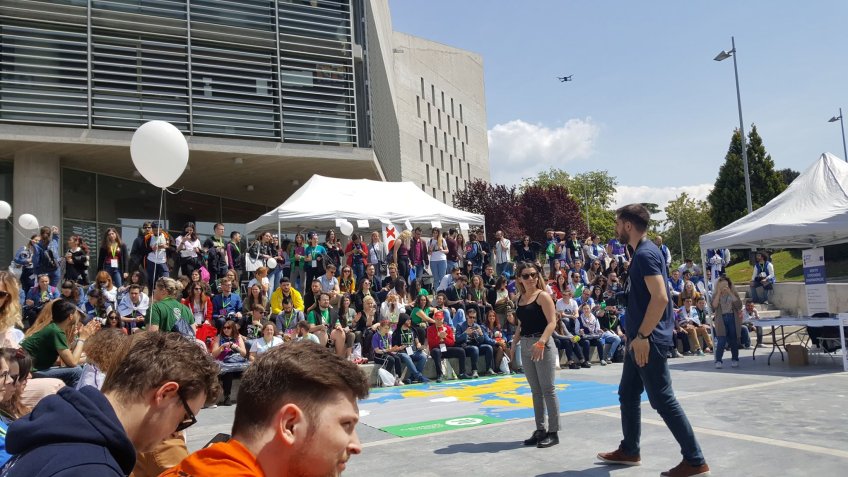
Day 5: Skopje, North Macedonia
Julius Lajtha (Vienna, Austria)
As was already a tradition, the first thing we did upon arriving in a city was having a nice dinner and then checking out night life. North Macedonia welcomed us, once again, with even friendlier people and even lower prices. Also in this town, a participant’s friend, Tamara, welcomed us and showed us around. Coming across statues about every 200 metres, one could not overlook that this city had one thing it wanted to share with its visitors: pride in Alexander the Great. In fact, we learned that large parts of the so-called “old town” around the main square and the bridge across the river were only built rather recently, by the then-leader Nikola Gruevski.
Gruevski’s statue project quickly fell into disrepute, and some statues have now been renamed – including the big one originally made to depict Alexander the Great, which is now called “Equestrian Warrior”. Many of us expressed the feeling of stage design, because the density of statues and number of seemingly old, but manufacture-clean houses made one feel like one was either on a film set of in an open-air museum where things were partly not original anymore.
The next morning, we were able to follow an extremely elaborate debate on North Macedonia and it’s to-be entry to the EU at the EU Info Centre. Featuring the JEF Executive Board member Céline Geissmann, the panel debate drew a large crowd of people and up to 8 different video cameras into the room, that were both following the debate very closely.
What we had been told about EU enthusiasm in the morning, could easily be evidenced by the encounters with citizens that we had in the afternoon. Located right next to the tallest of the countless statues (the “Equestrian Warrior”), our information stand and the big map of Europe attracted more interest than ever before and led to a lot of good conversations. Packing up our stuff and heading back to the bus allowed for the first depressive vibes to spread, since it became clear that the tour would very soon come to an end, which was not at all what anyone was looking forward to. Okay, except our phone batteries and bodies, maybe.
Fun factor: 3.5/5
Difficulty level: 3.5/5
Success rating: 4.5/5
Day 4: Sofia, Bulgaria
Juuso Järviniemi (Paris, France)
In Sofia, we started the day with an election-themed panel debate at the Europe House, organised by JEF Bulgaria. The discussion itself was in Bulgarian, but each speaker made some opening remarks in English, while JEF Bulgaria wrote down English summaries of each talk. The speakers addressed the typical main issues of the European elections, such as the turnout, the threat of populism, and increasing the powers of the European Parliament. Among other themes, defence came up, with the overall atmosphere being in favour of more European defence cooperation.
When an attendee claimed that Bulgarian public opinion was ambivalent on the EU, each panellist intervened immediately, saying that the EU enjoyed high levels of trust among the public. The overall message that the politicians gathered at the event wanted to share was that Bulgaria is committed to its place in the European family.
We proceeded to campaigning outside in front of the Monument to the Soviet Army. The location was highly symbolic, especially as the plateau in front of the socialist realist statues is now used as a bike and skateboard training ground. As I looked at the young locals doing tricks, the juxtaposition between Europe’s violent past and peaceful present, between authoritarianism and freedom, touched me. Our tent had the slogan, “Europe is what we make of it”, written on it. In the 20th century, many believed that the world can only be changed through the force of arms. In the 21st, we’ve come to see just how far a good idea can take you.
Most of the young Bulgarians I talked with spoke excellent English, and didn’t seem the least bit confused when a stranger came to talk about European politics to them in a foreign language. A special mention goes to the young woman who, without blinking an eye, answered my first question by saying that she has heard about the upcoming European elections, but doesn’t believe in the concept of voting because her political conviction is anarchism. Fast forward five minutes, and we were discussing John Locke and Thomas Hobbes. We mostly agreed to disagree, but what an encounter it was!
After a sunny day of campaigning, we hit the road towards Skopje in North Macedonia. A rich dinner in our only non-EU stop along the way prepared us for the next day!
Fun factor: 5/5
Difficulty level: 3.5/5
Success rating: 4.5/5
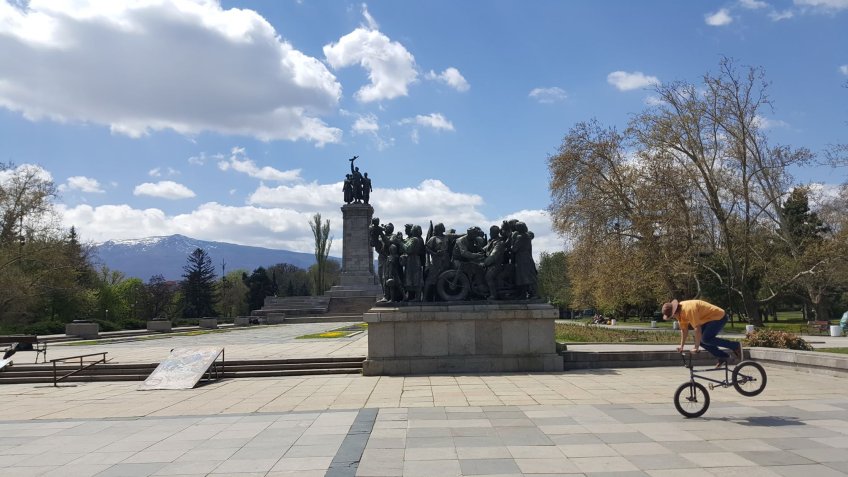
Day 3: The big road trip
Juuso Järviniemi (Paris, France)
We set off from Zagreb early in the morning, as we were anticipating a fifteen-hour drive through much of Croatia, the entire Serbia, and through the Bulgarian border in just one day. A day of waiting at border crossings, Balkan music and hunting for Internet connections! Fifteen hours on the car sounded terrifying at first, but with good company, a boombox and scenic views the drive went by much faster than expected.
While still in Croatia, we stopped by at a worn-down petrol station for a toilet break. As I saw destitute-looking old man sitting by the station, I thought that he, too, was likely an EU citizen. We were driving through rural areas, places which receive EU funding. Some Finnish citizens feel resentful about cohesion funds; personally, while travelling through a region previously entirely unknown to me, I rather was impressed with the diversity of life experiences and histories that the EU can bring together. United in diversity.
At border crossings, as we looked at the queues of lorries and waited to get through ourselves, we couldn’t help but think of the UK. The experience of spending the day without an Internet connection, due to high roaming fees, also stressed us beforehand, but as I mentioned, time passed quickly in the end. Nevertheless, our conclusion was that every Brexit supporter should try following our route and driving from Hungary to Slovenia, then out of the Schengen Area to Croatia, then out of the EU to Serbia, and then back to the EU to Bulgaria. The road trip has been a very concrete lesson in EU studies!
Listening to Ovo Je Balkan by Milan Stanković, singing to I Want It That Way with new, EU-themed lyrics, and photographing the hills and mountains of southern Serbia were our main pastimes during the long drive. And we still arrived in time in Sofia to have a late night dinner at a restaurant!
Fun factor: 3/5
Difficulty level: 3.5/5
Success rating: 4/5
Day 2: Ljubljana, Slovenia
Kati Systä (Turku, Finland)
After a rather late arrival in Ljubljana the second day started in sunny Ljubljana. The day included two events together with JEF Slovenia. We spent the morning campaigning the students of the University of Ljubljana and discussing the coming EU elections. All in all, the meetings were really good, and we had lots of fun with challenging students to name European dishes, singers and artists.
Later during the day, we headed to the market in central Ljubljana to continue campaigning. What surprised me the most was how many young people had not even heard of the coming elections. The task at hand turned largely to describing how European elections are organised. These discussions ended up being the most interesting ones and led to many pledges to vote from young people. I have been thinking quite a lot of the reasons behind young Europeans’ low participation in the elections and based on the very much non-empirical study done hours in the streets of Ljubljana, I am worried that unawareness of the elections plays a big role. This strengthens the thought that tours like this one are a good way of reaching out to fellow young Europeans.
The day finished with a drive to Zagreb. The start was delayed a little, but this only gave us time to get to know each other better and discuss for example how much easier life is with free movement. We got to experience this first hand when we got stuck after the passport control at the border between Slovenia and Croatia. After arriving to Zagreb rather late, some of us decided to ignore the 6am wake up to leave for Sofia and headed out to see the city. Ahead of us is the 15-hour bus ride to Bulgaria and you will hear soon enough how it went!
Fun factor: 4.5/5
Difficulty level: 2/5
Success rating: 4/5
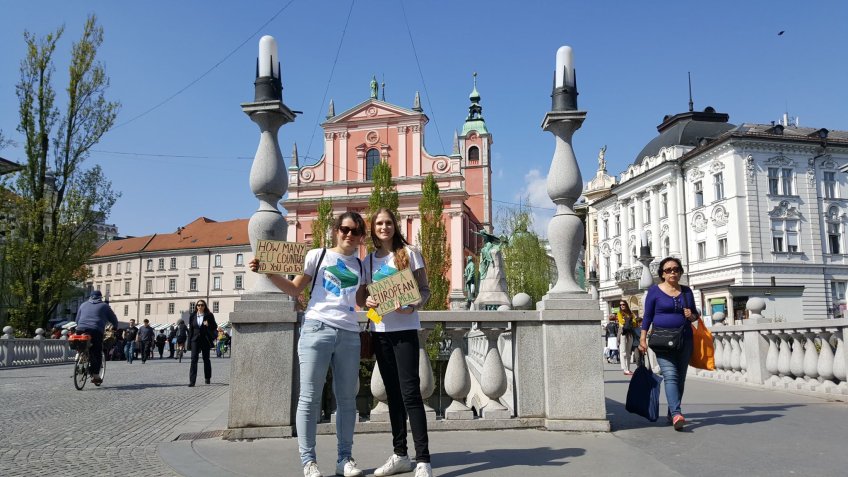
Day 1: Budapest, Hungary
Juuso Järviniemi (Paris, France)
The previous volunteers passed the baton to a new team in Budapest. As I arrived in Budapest, what struck me the most was the ubiquitous Fidesz posters on the streets. Just after a Finnish parliamentary election where five parties had won more than 10 percent of the vote, the absolute dominance of the Hungarian ruling party was difficult to fathom. In a proper democratic system you have fair competition between multiple different voices. As I was taking the bus from the airport to Budapest, I was not sure what Hungary was.
On the UNESCO-listed Heroes’ Square, under a monument dedicated to leaders of the Magyar tribes that settled around the area of modern-day Hungary in the 9th century, our task was simply to get to know each other. We played icebreaker games in sunshine before mounting the campaign bus and setting off to Slovenia.
The seven-hour journey offered plenty of time for discussions on everything between the Greenlandic independence movement and the 1998 FIFA World Cup. In the dark, we could not tell that we had crossed the Slovenian border before taking a break at a gas station and noticing that the language had changed. As we were buying food, the clerk asked us where our group was from, and after listing a number of countries we simply concluded that we were from Europe. The clerk responded by saying that she, too, was from Europe. From this borderland gas station, we picked up a Hungarian hitchhiker on his way to the Alps, and made conversation until arriving at a Ljubljana hostel late at night. Everyone went straight to bed in order to be fresh for a day of campaigning in Slovenia!
Fun factor: 4/5
Difficulty level: 1.5/5
Success rating: 4/5
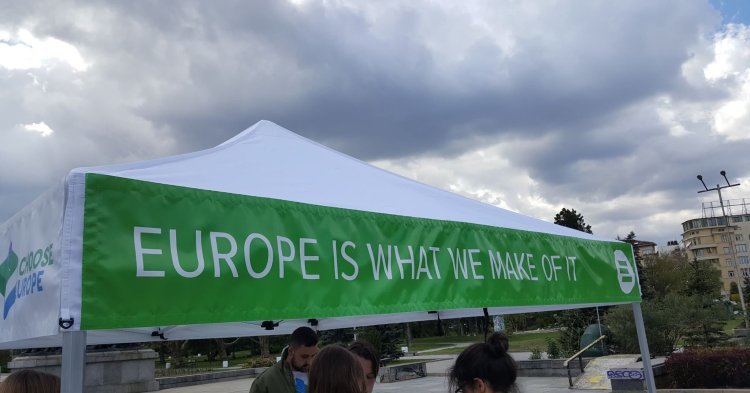
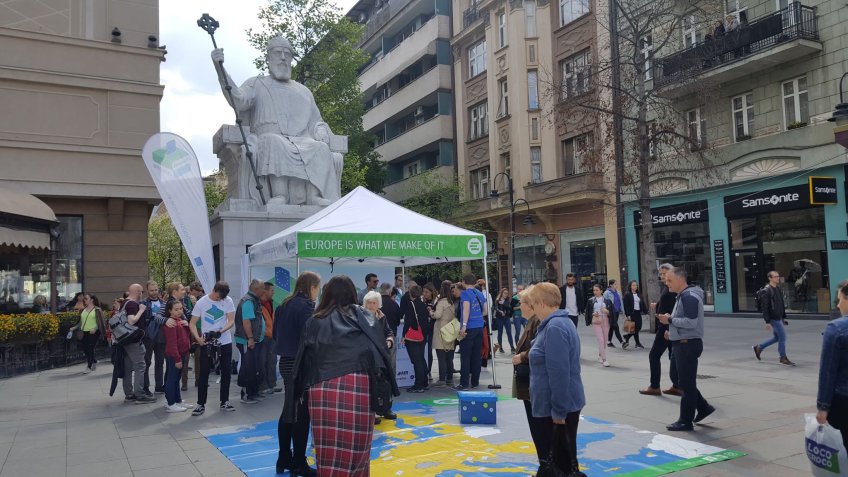
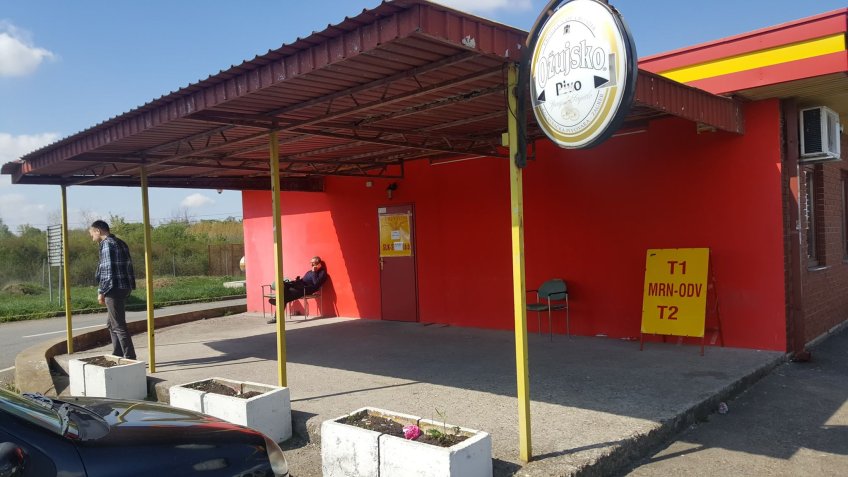

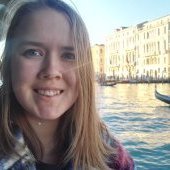
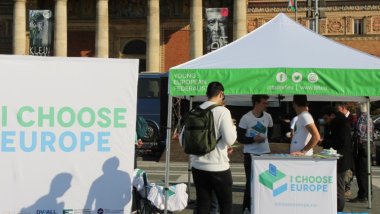
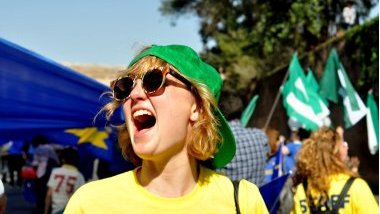
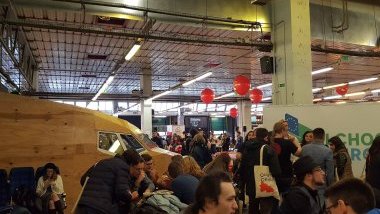
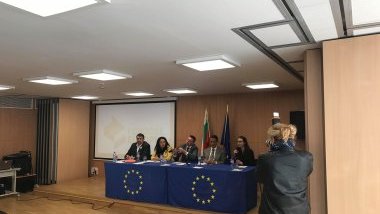
Follow the comments: |
|
